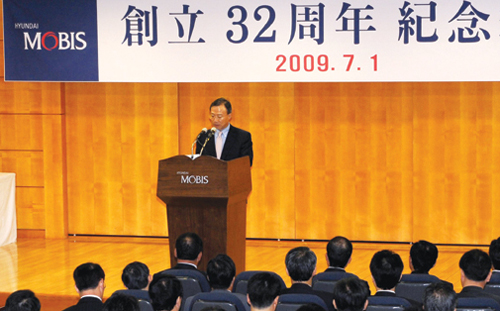Focus on R&D for Futuristic Cars
Hyundai Mobis to plunk down 1.2 tln won in R&D on new electronic parts for future autos

Hyundai Mobis Co. celebrated its 32nd anniversary on July 1 and announced a new vision designed to expand its R&D budget to 1.2 trillion won and double the number of research staff to more than 2,000 by 2015.
Vice Chairman Kim Dong-jin, in his anniversary speech at the ceremony, said the auto parts maker will try to double annual OEM sales to 22 trillion won by 2015 from the current 12 trillion won, while bringing the sales of hybrid car parts such as airbags, brake systems, lighting systems and other key parts to 50 percent of the company's total annual sales in 2015.
He said he will steer the company to change its main business structure from a profit-oriented one to a high-tech centered one in the future to produce a high value-added portion under the catchphrase of "Driving Science."The company will plunk down 1.2 trillion won for R&D activities dedicated to research on electronic parts in futuristic automobiles. The number of research staff will be doubled to more than 2,000 to show the company's heavy emphasis on the development of new electronic parts for future autos.
The R&D center will be split into two sections, one for leading auto technologies and the other for mass production technologies, and set up a new exclusive research complex for electronic auto parts in the research center's new lab site.
Key parts affiliates of the Hyundai Motor Group and Samsung Group will engage in the joint development of core parts for future automobiles. The joining of hands between two leading large corporations in Korea is resulting in anticipation of enhanced national competitiveness in relevant parts technology, which is now dominated by a small number of advanced foreign companies. Hyundai MOBIS announced on April 30 that it concluded a technology cooperation contract with Samsung LED for joint development of a module and an LED for vehicle headlamps.
The LED is garnering attention as an environmentally-friendly light source for future automobiles. In particular, the LED headlamp for vehicles is a cutting-edge automotive part that brings together a wide array of key technologies, including the optical structure, lens technology, heat dissipation system, ECU module and semiconductor device.
This contract is extremely meaningful in that it marks a partnership that overcomes industry boundaries for the development of futuristic technology between Hyundai MOBIS, a company with design and manufacturing technology for key automotive parts, such as brake systems, airbags and headlamps, and Samsung LED, which has proprietary LED technology that is applied to mobile phones and LCD television sets.
According to the contract, Hyundai MOBIS and Samsung LED will share information on headlamps and LED-related technology, and launch the joint development for the localization of an LED device for vehicle headlamps. The strategy is for Hyundai MOBIS to complete development of relevant technology by the end of this year and to apply the LED headlamp to high-class models of Hyundai and Kia Motors starting next year.
Currently commercialized LED headlamps for vehicles have been applied only to Toyota's Lexus 600h model (low beam) and Audi's R8 model (high and low beam). Relevant technological development is in its initial phase all across the globe. It is therefore forecasted that advanced companies will engage in fierce competition to dominate relevant technology.
Hyundai MOBIS President Jeong Seok-su said, "The LED headlamp that we will be jointly developing with Samsung will feature world-leading performance and higher price competitiveness than products offered by advanced companies. Based on such competitiveness, we will increase the scope of applications of environmentally-friendly LED headlamps to general models. We have also drawn up plans to export the product to overseas car companies." The relevant industry estimates that the global LED market for vehicles was roughly 900 billion won last year. It is forecasted that demand in the market will reach around 1 trillion won this year and 1.15 trillion won in 2010.
Hyundai MOBIS also plans to work on developing the LED headlamp into a high value-added product by applying it to the Adaptive Front Lighting System (AFLS). Last year, Hyundai MOBIS succeeded in the localization of AFLS, which automatically moves lamps according to changes in such conditions as the road, driving and weather. nw
Vice Chairman Kim Dong-jin of Hyundai Mobis Co. makes a speech during a ceremony on July 1 to mark the company's 32nd anniversary.
3Fl, 292-47, Shindang 6-dong, Chung-gu, Seoul, Korea 100-456
Tel : 82-2-2235-6114 / Fax : 82-2-2235-0799